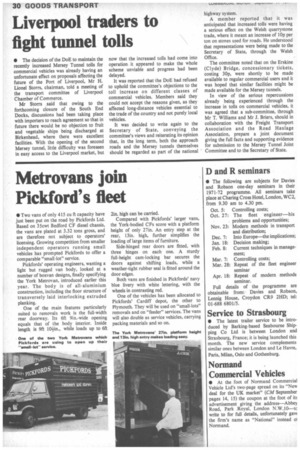Liverpool traders to fight tunnel tolls
Page 32

If you've noticed an error in this article please click here to report it so we can fix it.
• The decision of the DoE to maintain the recently increased Mersey Tunnel tolls for commercial vehicles was already having an unfortunate effect on proposals affecting the future of the Port of Liverpool, Mr H. Lionel Storrs, chairman, told a meeting of the transport committee of Liverpool Chamber of Commerce.
Mr Storrs said that owing to the forthcoming closure of the South End Docks, discussions had been taking place with importers to reach agreement so that in future there would be no objection to fruit and vegetable ships being discharged at Birkenhead, where there were excellent facilities. With the opening of the second Mersey tunnel, little difficulty was foreseen in easy access to the Liverpool market, but now that the increased tolls had come into operation it appeared to make the whole scheme unviable and progress had been delayed.
It was reported that the DoE had refused to uphold the committee's objections to the toll increase on different classes of commercial vehicles. Members said they could not accept the reasons given, as they affected long-distance vehicles essential to the trade of the country and not purely local vehicles.
It was decided to write again to the Secretary of State, conveying the committee's views and reiterating its opinion that, in the long term, both the approach roads and the Mersey tunnels themselves should be regarded as part of the national highway system.
A member reported that it was anticipated that increased tolls were having a serious effect on the Welsh quarrystone trade, where it meant an increase of 10p per ton on stones used for roads. He understood that representations were being made to the Secretary of State, through the Welsh Office.
The committee noted that on the Erskine (Clyde) Bridge, concessionary tickets, costing 30p, were shortly to be made available to regular commercial users and it was hoped that similar facilities might be made available for the Mersey tunnels.
In view of the serious repercussions already being experienced through the increase in tolls on commercial vehicles, it was agreed that a sub-committee, through Mr T. Williams and Mr J. Briers, should in collaboration with the Freight Transport Association and the Road Haulage Association, prepare a joint document giving the full facts and supporting evidence for submission to the Mersey Tunnel Joint Committee and to the Secretary of State.




















































































































